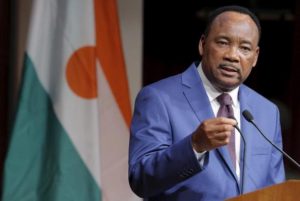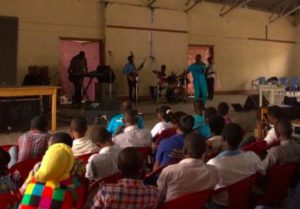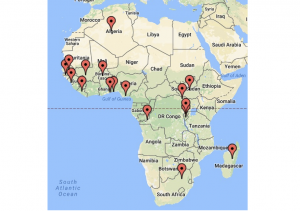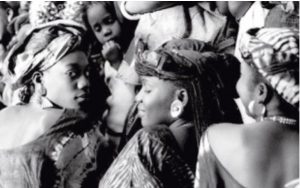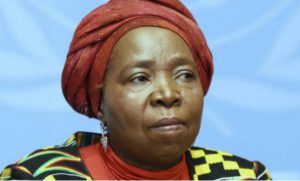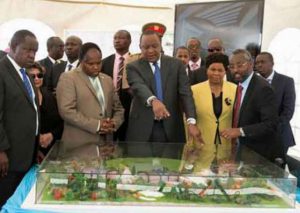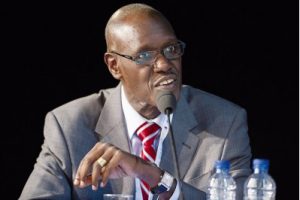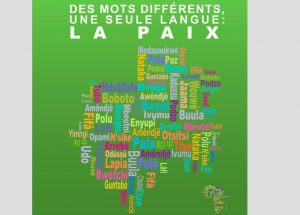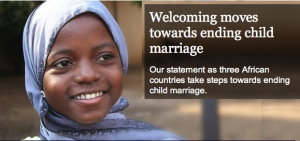FREE FLOW OF INFORMATION
An article from the Angola Press Agency
The 2nd international conference on the culture of peace in Africa, which ended Monday [December 12] in Luanda, is a testament to Angolan President José Eduardo dos Santos’ commitment to promoting durable peace on the continent, said the Director of the Regional Office UNESCO Multisectoral Program in the Countries of Central Africa, Felix Iyé.
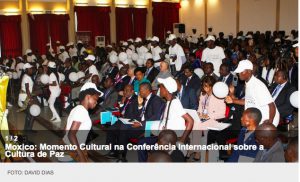
A cultural event during the 2nd international conference on the culture of peace
click on the photo to enlarge
The representative of the United Nations Fund for Education and Culture (UNESCO) was speaking at the ceremony of the event sponsored by the Eduardo dos Santos Foundation (FESA), in celebration of his 20th birthday and his 73 year old patron, José Eduardo dos Santos.
Speaking to representatives of more than a dozen African countries, Cameroonian Félix lyé said that the event is a sufficient testimony of Angola and President José Eduardo dos Santos, in favor of promoting the culture of durable peace in Africa.
He added that in the world-wide concept of education and citizenship there is a conviction that peace can not have a lasting basis if respect for all is not encouraged in ways that foster a sense of belonging to a common humanity and help learners to become Citizens of the world, responsible and active.
The event, which was opened by Education Minister Pinda Simão and closed by his Youth and Sports counterpart, Albino da Conceição, was attended by representatives of the networks of research institutions to promote a culture of peace in Africa, led by Fesa, and Of other institutions, Cameroon, South Africa, South Sudan, Ivory Coast, Ethiopia, Senegal, Congo, Nigeria, Tunisia, Belgium, Botswana, Gabon, Uganda, Niger, among others.
The 2nd conference, a social object of Fesa, addressed the “prevention of violence and the promotion of a culture of peace in electoral period in Africa: What contributions of the network of foundations and research institutions.”
He also discussed the “role of young people in the prevention of violence and the promotion of a culture of peace in the electoral period” and a presentation was made of the campaign for the culture of peace in Central Africa: Two different words, one language: Peace [See CPNN articles from July 11 and July 20, 2016].
( Click here for the Portuguese original.)
(Article continued in right column)
Question related to this article.
The Luanda Biennale: What is its contribution to a culture of peace in Africa
Will UNESCO once again play a role in the culture of peace?
(Article continued from left column)
The 2nd international conference for the promotion of peace in Africa was held under the motto Prevention of Violence and Pormotion of the Culture of Peace in the Elietoral period in Africa.
[The following is added from another article from the Angola Press Agency
At the 2nd International Conference on the Culture of Peace in Africa, Education Minister Pinda Simão reaffirmed that the country has accepted the challenges of embarking on the Unesco Operational Strategy2014 / 2021, which identifies peacebuilding through the formation of a society Inclusive, peaceful and resilient, with a goal to maintain peace.
He added that at the same time there was a growing sense of responsibility and solidarity with other African peoples, such as coordinating efforts in the Great Lakes region, the Central African Republic, Guinea-Bissau and other territories seeking peace.
In this regard, he recalled that the concept of a culture of peace was born in Africa during the international conference on peace and the spirit of men organized by the United Nations Educational, Scientific and Cultural Organization (UNESCO in 1998 in Côte d’Ivoire).
Elucidating that the culture of peace consists in developing values, attitudes and behaviors that reflects and favors the coexistence and partnership founded on the principles of freedom, justice and democracy in all human rights, tolerance, solidarity, rejecting violence and dedicating itself to Prevention and conflict.
“As having its root causes and problem solving through dialogue and negotiation to ensure full exercise of its rights, as a member of participation in the process of development of the person and society,” he said.
For the minister, peace is a deeply rooted desire in humanity. It is the inspiration of a reconciled society and is the condition of a decent life, because to be human peace is not a natural process but culture. Therefore, it needs to be built, consolidated and cared for, educating for peace.
“Pope Paul VI reinforced the idea of peace by presenting peace as the new face of development. This is not a ready thing is a continuous make, it is a dynamic and permanent process that affects all people and all institutions, “he stressed.
